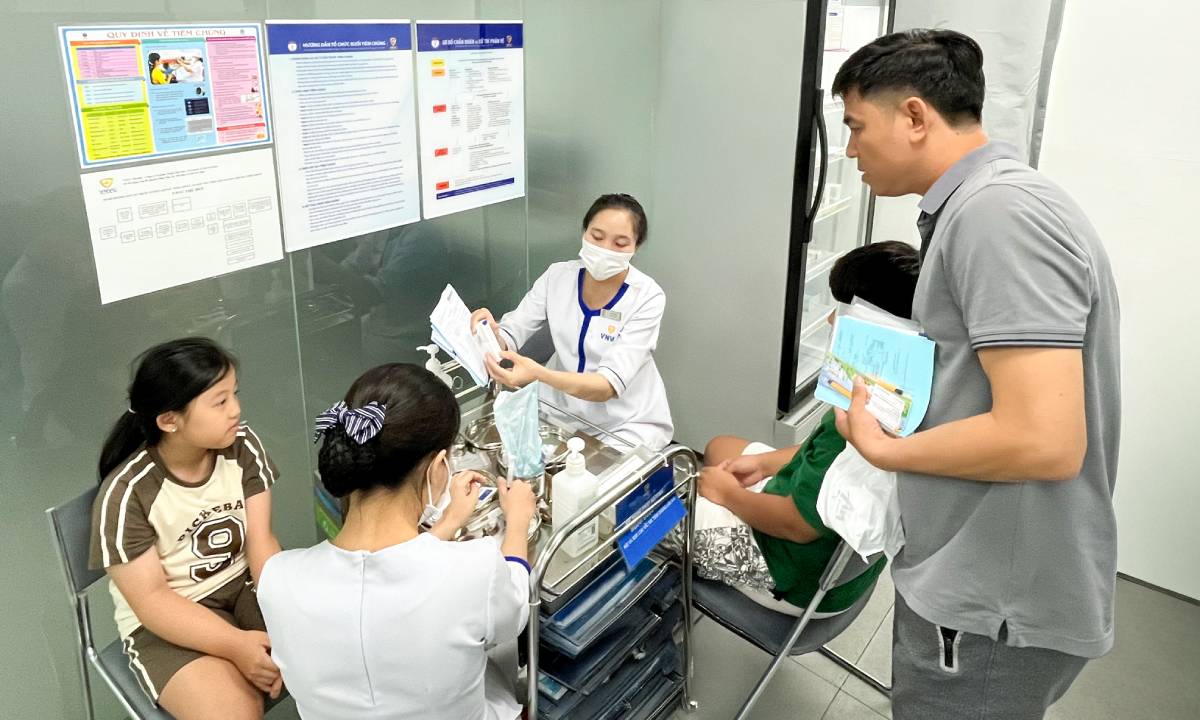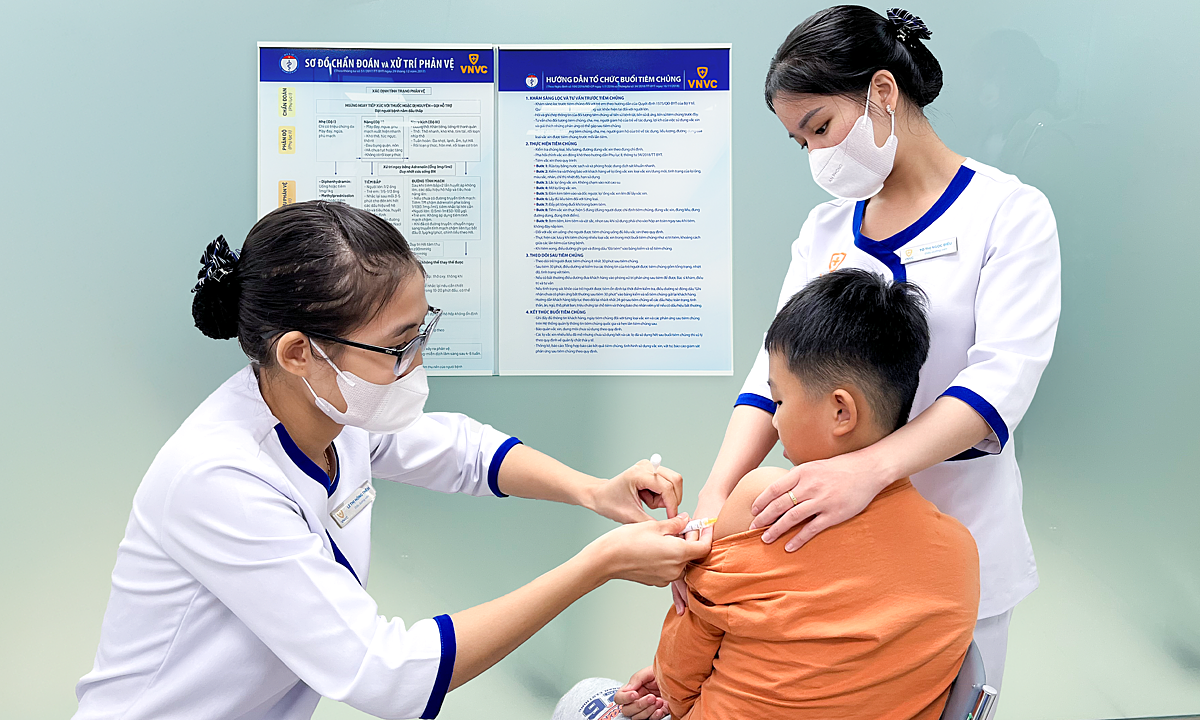Quyen experienced her first dengue infection, while her husband had his second, in 2/2025. Both suffered from fever, body aches, eye socket pain, and loss of appetite. By the 4th day, their fevers subsided, and the aches lessened. However, that evening, both experienced chills, shivering, and bleeding gums, prompting them to seek treatment at Thu Duc General Hospital in Ho Chi Minh City.
Quyen's case was milder, requiring only oral and intravenous rehydration, allowing for an early discharge. Her husband, however, showed signs of dengue shock, necessitating intravenous fluids and 10 days of monitoring for hemorrhagic complications. Thanks to prompt hospitalization and effective treatment, he narrowly escaped critical condition. The doctor advised them that they could contract dengue again due to the four different serotypes of the virus, urging them not to be complacent and to get vaccinated 6 months after recovery.
On 8/8, Quyen, her husband, and their two children went to the VNVC Dang Van Bi Vaccination Center in Thu Duc Ward, Ho Chi Minh City, to receive dengue and flu vaccines. Quyen admitted to still being terrified of dengue and actively seeking preventive measures. She hires monthly mosquito spraying services and diligently clears standing water around her home. She also instructs her children to wear long clothing during early mornings and late afternoons, advising them to stay indoors during these peak mosquito hours.
 |
Quyen's husband and two children receive dengue vaccines at VNVC Dang Van Bi Vaccination Center in Thu Duc Ward, Ho Chi Minh City. Photo: Dieu Thuan |
Quyen's husband and two children receive dengue vaccines at VNVC Dang Van Bi Vaccination Center in Thu Duc Ward, Ho Chi Minh City. Photo: Dieu Thuan
"The doctor said anyone who gets dengue a second time is likely to have a severe case. My husband was lucky to be saved. I don't know what would have happened otherwise," Quyen shared, adding that both she and her husband experienced lingering effects like hair loss, joint pain, and insomnia.
Phan Kim Nhat, 39, from Tang Nhon Phu Ward, Ho Chi Minh City, still vividly recalls the doctor's words from 3 years ago: "If he doesn't make it past the 4th day, the hospital will have no choice but to send him home." This was in 2022, when her then 8-year-old son experienced his second dengue infection. His first infection, at age 5, presented with fever, restlessness, fussiness, poor appetite, and nausea. Diagnosed as a mild case, he recovered at home within 7 days.
During his second infection, after 3 days of persistent high fever (39-40°C), his fever broke, but he complained of fatigue and headaches. His family rushed him to Children's Hospital 1. There, he presented with low blood pressure, hemoconcentration, and coagulopathy, leading to a diagnosis of dengue shock with the risk of multiple organ failure. Thanks to aggressive fluid resuscitation, respiratory support, and intensive care, he overcame the critical phase after 2 days of hospitalization.
Following their son's near-death experience, Nhat and her husband, fearing another infection, moved their family from a ground-level house to a high-rise apartment to minimize mosquito exposure. As soon as the dengue vaccine became available in Vietnam, she immediately registered her entire family of 4.
Dengue fever is an acute infectious disease caused by the dengue virus, transmitted from an infected person to a healthy person through the bite of the Aedes mosquito, primarily Aedes aegypti.
 |
Nhat's son receives a dengue vaccine after two previous infections. Photo: Dieu Thuan |
Nhat's son receives a dengue vaccine after two previous infections. Photo: Dieu Thuan
According to Dr. Tong Thi Ngoc Cam, Deputy Medical Director of the Northern Region at VNVC Vaccination System, there are four serotypes of the dengue virus: Den-1, Den-2, Den-3, and Den-4. A person can contract dengue up to 4 times, each with a different serotype, with subsequent infections potentially more severe.
Dr. Cam explained that after the initial dengue infection, the body produces long-term specific antibodies against that particular dengue virus serotype, offering cross-protection against other serotypes for approximately 6 months. After this period, individuals remain at high risk of contracting dengue again from a different serotype. In subsequent infections, pre-existing antibodies bind to the new dengue virus but are unable to neutralize it. Instead, they facilitate viral entry into immune cells, increasing the inflammatory response and leading to severe complications like hemorrhaging and shock. This phenomenon is known as antibody-dependent enhancement (ADE).
Dr. Cam warned that the current dengue outbreak in Vietnam is complex, with over 40,000 cases, many experiencing complications such as internal bleeding, cerebral hemorrhage, multiple organ failure, and even death. As there's no specific treatment for dengue, prevention is crucial. This includes mosquito control measures like eliminating breeding sites by clearing bushes and removing stagnant water containers in and around homes. Wearing long clothing, using mosquito nets day and night, mosquito repellent sprays and coils, and using mosquito repellent patches and wipes for children are also recommended.
Dengue fever can be effectively prevented with vaccination. Vietnam now has the Qdenga vaccine, manufactured by Takeda Pharmaceutical Company, indicated for children aged 4 and above, as well as adults. The vaccination schedule consists of two doses, administered 3 months apart. The vaccine prevents over 80% of dengue cases and over 90% of hospitalizations. Women are advised to get vaccinated at least one month, and ideally three months, before pregnancy.
Dr. Cam reported a 150% increase in vaccine uptake across over 230 VNVC vaccination centers nationwide. In addition to those proactively seeking vaccination, many individuals have been motivated by personal experiences with dengue, or cases among family, neighbors, friends, or colleagues, as illustrated by the two cases mentioned above.
Cong Nguyen












